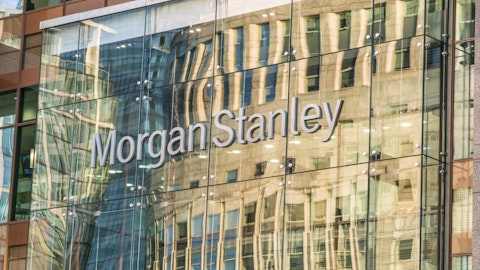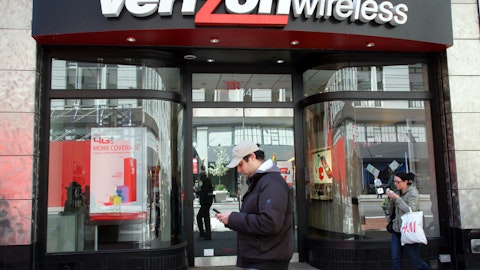And to the degree that we don’t see opportunities to deploy it with our clients, we will return it to shareholders. At the moment, we’re taking a more conservative posture around that, just given some of the uncertainty around Basel III endgame. Although again, I think that’s going to continue to evolve. And I also think we have a long track record of being very, very nimble with our ability to deploy. So we’re going to continue to focus on making sure we’ve got the right resources to serve our clients. And as we generate capital, we have confidence in our capital position that we’ll return capital to shareholders. And we’ve been very focused, as you’ve seen, on growing the dividend, and we plan to continue to do that.
Matt O’Connor: And then just separately following up on the exit of legacy on-balance sheet principal investment, is there an expense reduction opportunity as those investments and some of the infrastructure goes away over time?
David Solomon: There is an operating leverage story, which is one of the reasons why the margin in our Asset & Wealth Management business will continue to improve. When we were running an on-balance sheet business with lots and lots and lots of on-balance sheet position, the number of people that you need to manage those positions and serve those positions, creates a business that’s scaled differently than a traditional fund management business that you would see on someone else’s alternative platform. And so we’re early in the journey. I’ll just give a simple example. We went out last year, a year-and-a-half ago, and raised our first growth equity fund. We used to do that business on-balance sheet. We have lots and lots of positions, and therefore, a very, very broad team to service that.
We raised our first fund. You need a smaller team to manage that fund. But when you go and you raise your second fund, you don’t need to increase the scale of the team. And so there’s real operating leverage in that, and that’s part of our margin improvement story in Asset & Wealth Management over time. So the answer is, yes. I don’t want to overstate this because it’s not a massive part of the story, but it is a place where we have some operating leverage and improvement as we continue to move from balance sheet into fund form.
Matt O’Connor: Okay, thank you for the color.
Operator: Thank you. We’ll go next to Gerard Cassidy with RBC.
Gerard Cassidy: Good morning, David. Good morning, Dennis.
Denis Coleman: Good morning
David Solomon: Good morning, Gerard.
Gerard Cassidy: Good morning. In your prepared remarks, David, you were talking about, I think it was slide five or six, but about the success in growing the relationships with those top 100 FICC and equity clients, and you identified that the FICC and equity financing contributed to that success. And that’s been a real hallmark for you guys over the last two or three years, the growth in that business. Can you dig down for us and share with us what has attributed to the success? Is it the capital you put into that business, the hiring of additional folks or people in the business, and as well as competition. Has the competition been more challenged than some of your competitors at all? Credit Suisse, of course, is no longer around. But if you could just give us a little more color on what’s driving that success?
David Solomon: Sure, Gerard. At a high level, I’d point to a couple of things. But I’d start with the fact that that business is a scale business, and we happen to be in the privileged position of being one of a handful of firm that really does operate those businesses at scale. And I think that’s just important as a baseline. But I think there are a handful of things that we’ve done well. First, One GS and our One GS Ethos. If you go back historically, we operated these businesses much more in silos with much less coordination across broad client experience. And clients would come into the firm in different places and get different experiences. And we spent a lot of time, and this goes back to 2019 really, thinking about how do these clients experience the firm?
And we went out, we talked to them, we listened to their feedback. They really wanted to deal with the firm as a partner, one partner. I think we’ve made through One GS and that ethos, real progress in dealing with these very large clients in this business in an integrated approach that’s improved their experience. And because it’s improved their experience, they feel more partner-like with us, and therefore, that’s improved our wallet share. Secondarily, we’ve become a much bigger financer of their activities. And when you finance their activities, you get rewarded in other ways through the ecosystem. And number three, we’ve also tried to really take the same way we have with investment banking clients for a long view, a very long-term approach to transacting with them.
They need our help sometimes with things that aren’t that economically attractive. We want to be there. If you do that, you do that consistently, you wind up getting opportunities that are more attractive. And so I think those three things combined with our scale platform have really helped us. When we look at our wallet shares, we continue to spend a lot of time. John and I spend a lot of time, and Denis, too, talking to these clients in addition to the people running the business, asking for their feedback. And as we take that feedback, we’ll continue to make adjustments to make sure we can serve them with real excellence. And as you saw from the presentation that we put up, one of the things that we’re really focused on is how our One GS operating ethos allows us to serve our clients with excellence and distinction.
It’s a big, big tenet of what we’re trying to do.
Gerard Cassidy: Very good. And then I know you’ve talked about the pipelines and your comments about what we might be able to see in ECM and other areas this year. Can you also give us a little flavor on what parts of the — since you’re obviously a global force, what parts of the globe are you seeing the best potential? Is it the Americas, is it Europe, or is it Asia?
David Solomon: Well, it’s scale. The Americas is the biggest part of the activity level. And just given the resilience of the US economy, I think you’ve seen a material pick up there, proportionally that’s broader than other places. But we are seeing more activity across Europe, particularly strategic dialogue. I’d say, the one place where things are slower, obviously, is in Asia with respect to China. And just given the nature of economic activity there, where things are positioned, that still seems slower, both on both the M&A side and the capital market side. But those are comments that make it a high-level, Gerard.
Gerard Cassidy: Thank you. Always appreciate the insights. Thank you.
Operator: We’ll take our next question from Steven Chubak with Wolfe Research.





